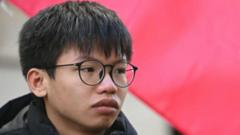Why Did Hong Kong Summon UK and Australia Envoys Over Activist Asylum?

Pro-Democracy Activists Granted Asylum: A Shift in Global Politics
The recent asylum grants to two pro-democracy activists from Hong Kong—Ted Hui in Australia and Tony Chung in the United Kingdom—mark a significant moment in the ongoing struggle for democratic freedoms in the region. Their cases have not only sparked outrage from the Hong Kong government but have also highlighted a growing divide between authoritarian governance and the values of freedom and democracy upheld by many Western nations. As the Chinese special administrative region's government expresses its discontent, we delve into the implications of these asylum grants and the broader context surrounding them.
The Context of Asylum in Hong Kong
In recent years, Hong Kong has witnessed a dramatic shift in its political landscape. The introduction of the National Security Law in 2020 was a watershed moment that many believe was designed to stifle dissent and control public opinion. Critics argue that this law has been used as a tool for political repression, leading to widespread arrests and the silencing of voices calling for democracy.
Hui and Chung’s asylum cases are emblematic of the plight faced by many pro-democracy activists in Hong Kong. The law, which was imposed by the Chinese government, has been criticized for its vague definitions and broad reach, making it easier for authorities to arrest individuals based on their political beliefs rather than concrete actions.
The Stories of Ted Hui and Tony Chung
Ted Hui, a former lawmaker, became a prominent figure during the anti-government protests in 2019. His outspoken nature and symbolic protests—such as throwing rotten plants in the Legislative Council chamber—captured public attention as he criticized the deteriorating political climate in Hong Kong. After fleeing to Australia in December 2020, Hui faced multiple charges under the National Security Law and sought refuge for his family.
Meanwhile, Tony Chung, a student leader, has also faced intense scrutiny from Hong Kong authorities. In 2023, he was convicted of calling for Hong Kong's secession, an act that led to his decision to leave the city. Chung's recent announcement that he has received refugee status in the UK represents both a personal victory and a broader call for international support for those fighting for democracy in Hong Kong.
The Global Response to Hong Kong’s National Security Law
In the wake of these asylum grants, the Hong Kong government summoned the British and Australian envoys, warning against "harbouring offenders." This response underscores the tense diplomatic relations between China and these Western nations, which have shown support for pro-democracy activists and condemned the actions of the Hong Kong government.
Critics of the National Security Law argue that it is an infringement on human rights and an attempt to erase the freedoms that were promised to Hong Kong under the "one country, two systems" principle. The UK, in particular, has been vocal in its condemnation of the law, highlighting cases like Hui's and Chung's as examples of transnational repression.
Implications of Asylum for Pro-Democracy Movements
The granting of asylum to these activists could set a precedent for how Western nations respond to similar cases in the future. It sends a strong message that the international community is watching and is willing to support those who face persecution for their political beliefs. Additionally, it raises questions about how countries like Australia and the UK balance their diplomatic relationships with China against their commitments to human rights and democracy.
As more activists seek refuge abroad, the implications extend beyond individual cases to the broader pro-democracy movement in Hong Kong. The support from foreign nations may embolden others to continue their fight against authoritarianism, while also putting pressure on governments to address human rights abuses in Hong Kong.
The Psychological Toll on Activists
Both Ted Hui and Tony Chung have spoken about the psychological toll that the political climate in Hong Kong has taken on them and their families. The constant threat of arrest and persecution can lead to immense stress, anxiety, and fear. For many activists, the decision to flee is not just about escaping legal repercussions; it is a matter of survival and the need to protect their loved ones.
The emotional weight of leaving one's homeland can be profound. Hui, for example, expressed sorrow at having to leave a place filled with cherished memories. This duality of seeking freedom while mourning the loss of one's home is a reality faced by many who flee oppressive regimes.
Future of Democracy in Hong Kong
As the situation in Hong Kong evolves, the future of democracy remains uncertain. The National Security Law has effectively dismantled many of the freedoms that were once taken for granted. However, the stories of activists like Hui and Chung serve as a reminder that the struggle for democracy is far from over.
The resilience of the pro-democracy movement in Hong Kong continues to inspire individuals across the globe. Many are watching closely as these activists navigate their new lives abroad while advocating for change in their homeland. The international community's response will play a crucial role in shaping the future of democracy in Hong Kong.
Conclusion
The granting of asylum to Ted Hui and Tony Chung not only highlights the ongoing struggle for democracy in Hong Kong but also serves as a testament to the resilience of those fighting for their rights. As the global community continues to respond to these developments, the need for solidarity and support for pro-democracy movements remains crucial. The stories of these activists remind us of the importance of defending human rights and the values of freedom and democracy.
Frequently Asked Questions
What is the National Security Law in Hong Kong?
The National Security Law is a controversial piece of legislation introduced in Hong Kong in 2020, which is intended to prevent secession, subversion, terrorism, and collusion with foreign forces. Many critics argue that the law is used to suppress dissent and limit freedoms.
Who are Ted Hui and Tony Chung?
Ted Hui is a former lawmaker known for his outspoken criticism of the Hong Kong government. Tony Chung is a student leader who has been actively involved in the pro-democracy movement. Both have faced charges under the National Security Law.
What does asylum mean in this context?
Asylum refers to the protection granted by a nation to individuals who have fled their homeland due to persecution or fear of persecution based on their political beliefs, ethnicity, religion, or other specified criteria.
As we reflect on the ongoing situation in Hong Kong, one must consider: how can the international community further support those fighting for democracy in oppressive regimes? #HongKong #Democracy #HumanRights
Published: 2025-08-19 06:35:40 | Category: technology



